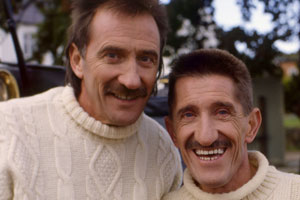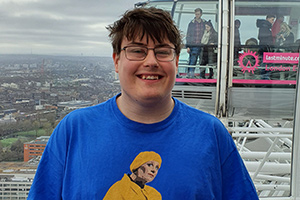Writing ChuckleVision
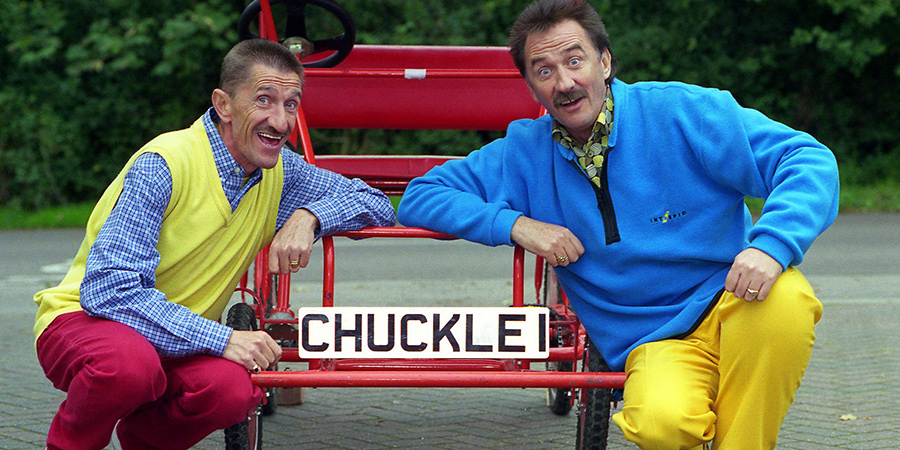
At 292 episodes, ChuckleVision is the second longest running sitcom in the UK after Last Of The Summer Wine. Running from 1987 to 2009, the show was a phenomenon. The Chuckle Brothers became icons of children's television, their catchphrases ingrained into the cultural lexicon.
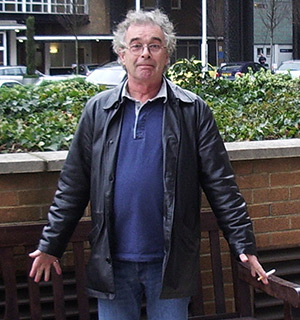
Everybody knows The Chuckle Brothers, but the name you might not know is John Sayle (pictured). Alongside Paul & Barry, with producer Martin Hughes, Sayle created the template that made ChuckleVision such a roaring success.
Sayle sent in a sketch for Morecambe & Wise. It was turned down but liked enough that he ended up writing gags for entertainers as diverse as Dave Allen and The Two Ronnies to Little & Large and Cliff Richard, which led him to meeting Paul & Barry in the eighties.
The basic characters of Paul & Barry were created not for ChuckleVision, but for a show aimed at a pre-school audience called The ChuckleHounds. Paul was still the bossy know it all, with Barry as the slightly dim sibling who actually knew more than Paul, but the twist was that the show was entirely silent. That is because Paul & Barry spent the show ensconced in huge dog costumes!
After the first two series of ChuckleVision, which were more closely modelled on breakfast magazine shows, The Chuckle Brothers, along with Sayle, created the familiar format that lasted a further twenty years. The basic formula was that each week Paul & Barry would attempt to take on a job or task for which they were woefully unsuited. While the weight of the show inevitably fell on the shoulders of the on-screen stars, it was the writers who kept the cogs turning behind the scenes.
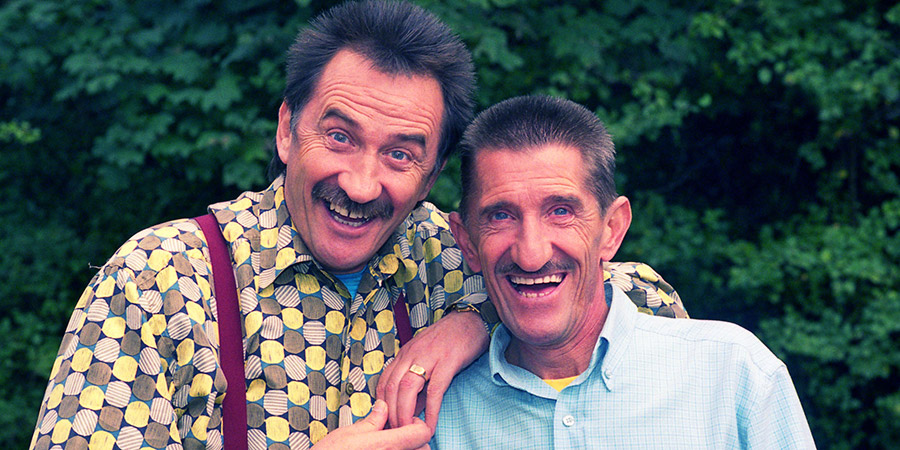
Sayle was the most prolific writer, clocking up 118 scripts across the span of the show. He also served as script editor for some of the series, being seen as the authority on the overall tone of the show.
Rory Clark is second in the ChuckleVision screenwriting strata, credited for over 50 scripts since Series 6. He co-wrote 11 of them with Robert Taylor, with whom he was developing a series on spec that happened to be similar in tone to ChuckleVision, so while producer Martin Hughes liked the idea, he couldn't make their show. However, he asked them to submit some ideas, one of which ended up as a Series 6 episode - Men In White Coats. Hughes was impressed and asked for three more. From then on they were regular writers.
According to Julian Dutton, who became co-lead writer in the show's later years, the scripts were "very tightly and heavily written". Each writer would come up with five or six ideas, making sure there was plenty of variety to choose from. This became more difficult as the years went on, with producer Martin Hughes insisting that no plots were recycled. It was an extremely collaborative process, with the writers riffing on each other's ideas. Once storylines had been brainstormed, episodes would then be assigned to each writer.
Every writer had their own penchant for particular approaches to the show. Clark "always liked starting shows with really dull, prosaic things, like them standing at a bus stop or having a cup of tea, then as the story moves and things start spiralling out of control; it's more effective because you have the contrast. I always feel that if you start big there's nowhere else to go. There's also a lot of fun to be had with them squabbling over every day, mundane things - stuff that most of us can identify with."
The old adage of sitcom is that there should be three gags per page. With a ChuckleVision script, the aim was to cram in as many as possible but, as Dutton elaborates: "The shows had to be gag-rich but always derived from their characters. I'm a bit fiercely defensive about writing 'light entertainment' - many people think, because it's 'light entertainment', it's an easy or light process to create. It's not. Just as much creativity goes into it as serious stuff or adult comedy. All the same elements have to be there - script structure, jeopardy, conflict etc.
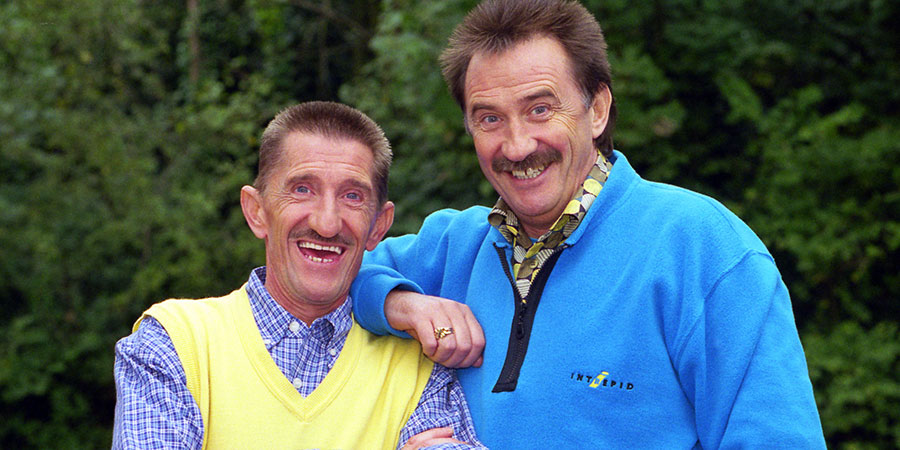
"I remember one person telling me that they thought The Chuckle Brothers just 'made it all up' on the day. Bewilderingly, this is still a common delusion of some people not in the business. But every ChuckleVision script was very tightly written. Every single thing you saw on-screen, had been written.
"And of course there were 292 episodes, so there was an extra challenge for the writers in not duplicating a gag or routine. This was probably impossible, to be fair, but it helped greatly that I was working alongside two writers who'd been there from more or less the beginning, and so when I'd suggest, maybe 'the Chuckles build a home-made rocket,' they'd say 'we did that in 1989'."
"In the show, Paul is the overconfident bully, but trying to find the right insults for him to use on Barry was tricky. They had to be hurtful and yet, for kids' TV, they had to be harmless at the same time" remembers Marie Findley, who wrote on the show from Series 11 along with writing partner Emma Millions. "'Ninny' was a good one, I think I may have even used 'Prune'.
"I remember one time trying to introduce something new: Barry's love of peas. Martin Hughes was all over that one - the Chuckles were legendary - you didn't reinvent their history with a random pea obsession. There were also things you had to be mindful of. You couldn't put Paul up a ladder to change a light bulb, or up a tree to rescue a kitten - Paul had a dodgy leg so Barry had to go up instead while Paul bossed him around from the safety of the solid ground.
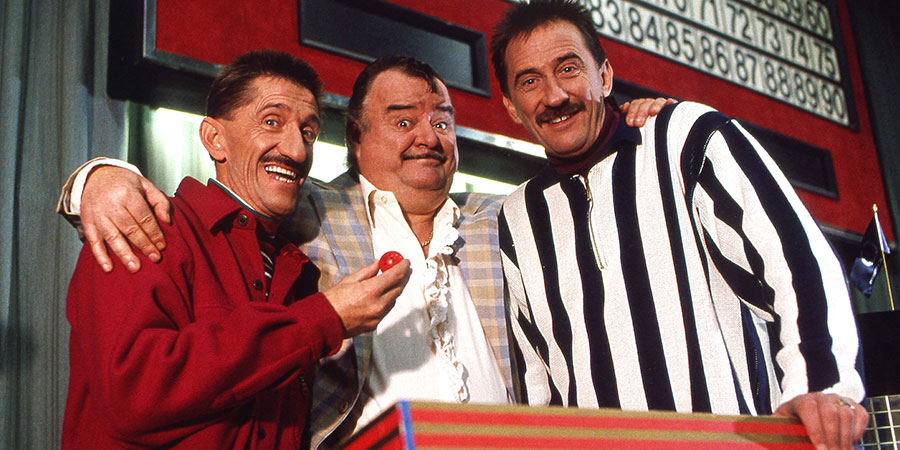
"The most difficult thing about writing for ChuckleVision, however, was trying to find a unique plot. The show had been running for so long they'd done everything you could think of. After writing the Western episode, both Emma and I thought that using well known film references might be the way forward - a homage to a storyline isn't the same as stealing one, right?! It was never as easy as I thought it was going to be though. In Cross Country Chuckles, my pretentious nod to The Loneliness Of The Long-Distance Runner and Chariots Of Fire is totally eclipsed by Paul slipping on a banana skin. The old ones are the best, eh?".
For fresh faced recruits, a writers' room could be intimidating, but ChuckleVision was a far more welcoming, enjoyable environment. According to Findley: "We'd been to writers' workshops before and were used to being the only women in the room. Normally, everyone is offered a beverage and then the male posturing and jostling begins. The jokes are flying thick and fast as comedy writers attempt to dominate the room. It's quite intimidating and it's supposed to be. This was different. John Sayle was there, and he didn't need to impress anyone - he'd been writing for Paul & Barry for years and even went on expensive holidays with them. His place in the pecking order was secure. We were joined by two other young guys whose full names escape me. These could have been our potential rivals, but instead of displaying our comedic prowess, I seem to remember we were all trying to out-nerd each other. Martin Hughes was there to interrupt us when we slipped down a D&D hole and keep us focused on the job at hand.
"The idea was to come up with a number of episodes and to flesh out the plots for each one together, then Martin would assign an episode to a writer. In one of these meetings, Martin introduced something a little special. He knew of an old, deserted town that could be used as the setting for a Western-inspired episode. One of the reasons that Martin was such a good producer was he could keep a tight hold of the purse strings. There is nothing that a commissioning editor likes more than a show that is cheap to make. Once he mentioned the Wild West though, we sensed some money was going to be spent.
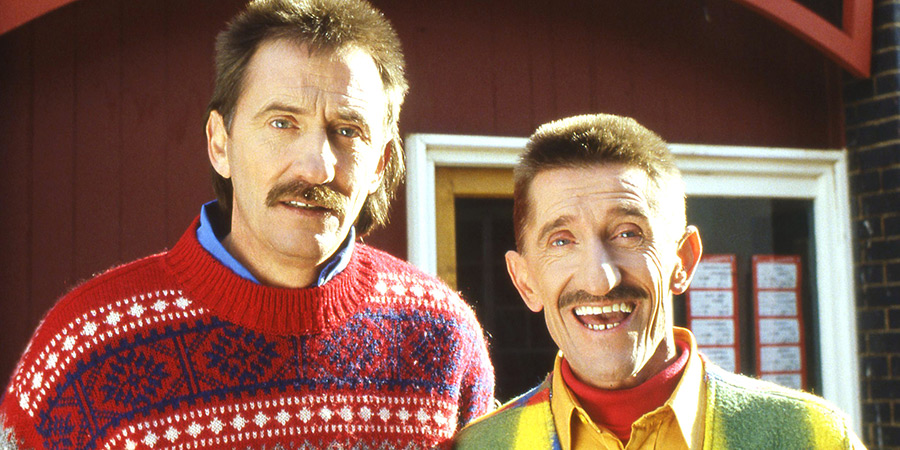
"The idea of a budget lubricated our brains and we were all throwing ideas on the table. This was going to be fun to write, but who was going to be chosen to write it? It was a tense moment and you could feel everyone bristling. To our genuine surprise, Martin chose Emma and I. Everyone did well to mask their emotions: the guys - their mild professional envy or annoyance; we - our deep sense of self-satisfaction. I didn't even like Westerns - I wasn't about to own up to that then. When it came to writing The Good, The Bad, And The Chuckles it was everything it promised to be, and I'll always be grateful that Martin turned that one over to us."
On the specifics of the scripts, actor and writer Ramsay Gilderdale remembers that when it came to writing in the gags, or 'laugh lines' as they are sometimes called, "as many as possible was the rule, without losing track of the storyline. The visual gags could be written in, though Barry and Paul always added in more - I tended to write in camera reveals and broad-brush slapstick, or even 'Barry and Paul do visual stuff', because they were so in tune with each other that they could come up with something on the hoof."
As with any show, time often ran as tight as the budget. An entire episode of ChuckleVision would be filmed in two days, which is why the scripts had to be completely signed off. However, when it came to the physical comedy there was always room for improvisation. According to Gilderdale, "There were tweaks on set, not rewrites generally - mainly more for practical purposes of filming than for substance. Paul & Barry could just turn on the business. I remember one time that there was a bit of a gap and Barry suggested they do a bit they did in panto in god knows when, sort of 'We could do the frying pan gag from Babes in the Wood in Cardiff in 1984' - and they went straight into it, like they had done it yesterday. Barry, especially, was an encyclopaedia of comedy."
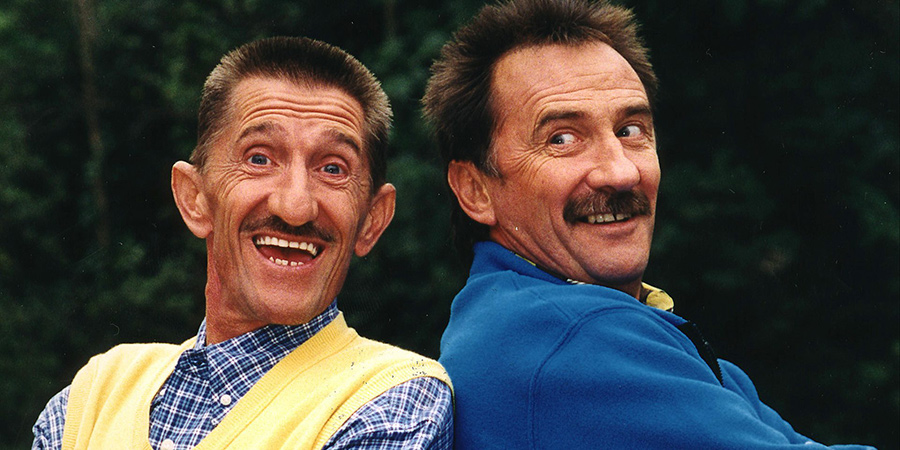
Emma Millions remembers that "Martin Hughes, the producer, was an absolute legend and our table meetings with all the other writers and the team were incredibly fun. As a very young writer, working on this show was the stuff of legends and it certainly taught me some fundamental comedy lessons. It was like writing for Laurel & Hardy or Harold Lloyd."
Dutton expresses similar sentiments, commenting that "it was a joy to watch them work. They were masters of their craft - a very specific, focused craft with a specific audience, but a craft nevertheless. Their skills go back decades, and back through their wider family to the age of variety - the Patton Brothers etc. So of course they were familiar with many comic routines, but to be honest when a script went to shooting, there weren't that many changes. Every joke, every situation, every physical routine, every visual gag, every movement, every word, was scripted. Of course they may have changed a line a little here and there, but the whole process was so efficient, and quick, that the luxury of sitting around and thinking 'right, let's change this bit, what shall we do?' wasn't there. There was no time.
"The script was king - and that's as it should be. Paul & Barry were the performers, and it was the writer's job to do all the script work. We'd film an entire episode in two days. That's an extraordinary achievement, especially for a largely physical show. I cannot emphasise how difficult it is to make a physical routine look effortless. They were masters at it, so to watch them bring a routine you'd written to life - and do it perfectly - was wonderful."
Russell T Davies, now much lauded for writing dramas as diverse as Doctor Who and Queer As Folk, scripted three episodes - A Lazy Day, Rich For A Day and Spooks and Gardens - early in his career. He admitted in an interview that for him, writing ChuckleVision was "very hard" and praised the "real skill the regular writers have got" in writing programme after programme.
With 292 episodes to choose from, picking a favourite would be tough for anyone, not least when your words are the driving force behind each one. I asked some of the regular writers of ChuckleVision what their picks would be and why the show holds such fond memories for them:
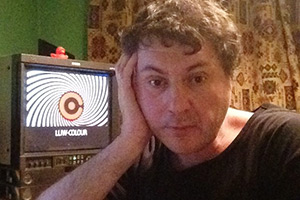
Rory Clark: "Anything with Jimmy Patton (Jimmy and Brian Patton were Paul & Barry's real-life brothers, known in the show as No Slacking and Getoutofit respectively). Dishing Up Trouble was a pleasure to write and worked really well I thought. Bedlam and Breakfast was a nice little farce and again worked well with the Chucks on top form. Everyone working their socks off from early morning until evening and then repairing to the hotel to work on the next day's scripts and set-ups. I remember Paul always lying down on his blue crash mat between takes.
"Shooting the opening scene for Perils of Petrovich at Stanstead airport and appearing in the background as a 'supporting artiste'. I remember Patrick Mower delicately smearing HP sauce over his face for a gag in the same episode, which I think was cut in the end. Another highlight was asking Roy Castle what he got up to last night, to which he replied, 'Me? I got up to about half past nine!'.
"I loved Paul Shane as the seedy, third-rate local celebrity in My Lucky Number's 9 and if I'd known Ted Rogers was going to turn up as the equally third-rate game show host in Let's Get Quizzical I'd have written the part more with him in mind. My favourite guest actor was a chap called David Oakley who appeared in Monkey Business and In the Soup, who did a brilliant line in neurotic hysterics."
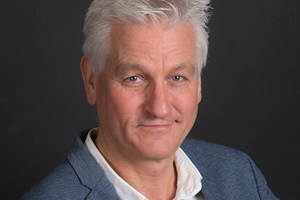
Julian Dutton: "I enjoyed all of them but I do have a fondness for one particular episode. I'd always wanted to do an episode set completely at night, and so I pitched an idea and it was accepted. I think it's called A Case for the Chuckles. It's a very claustrophobic episode, all set in a small hotel, and all at night. It's a classic 'misunderstanding' plot. Writers do like to challenge themselves to keep fresh - a bit like the 'on their own' episodes of sitcoms like One Foot In The Grave, and Hancock.
"The other episode I have a fondness for is actually the very last episode of the entire series. We were sort of aware that the series was coming to an end, and the producer asked us to pitch ideas for the finale. I pitched an idea for 'Little Chucks,' an sort of origin story where a plot today is connected to a plot from years ago when they were kids. See How They Run, I was very chuffed to have it commissioned and I think it turned out fun.
"They were all fun memories, but - to be honest - when you're working in TV the collective focus is on the work and making it right. It's fun, but work. My biggest memory is when I first visited the set and met Paul & Barry for the first time. Their first words to me were 'Fantastic script, Julian!' which is of course music to a writer's ears."

Ramsay Gilderdale: "Probably the airport one - Airport Assistance - it had bits of Laurel & Hardy in it.
"I remember a long discussion about having Paul & Barry on the luggage carousel and whether it was the right example to give children, but it worked."
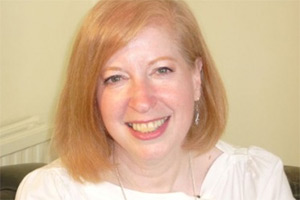
Gail Renard: "An episode I remember fondly is Indiana Chuckles, the first I wrote for Paul & Barry. Just watching them film was an education. They had exquisite comedy timing; they were also the loveliest of men. I especially remember that episode because Barry taught me the old trick of whipping a tablecloth out from under a tableful of china. I'm still waiting for a special occasion to use that one!"
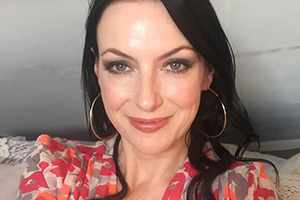
Marie Findley: "The first episode I wrote was with my former writing partner, Emma Millions, called Optical Illusions. We set the episode in an opticians we'd called The Sight Site - to this day I still don't know why there isn't an opticians called that. But then they don't go in for puns, not like hairdressers. We shared a computer back in those days and it was housed in Emma's attic room in the house we rented with three others. Emma would type in the script and then I'd read it back to see if it was still funny. In order to do this I'd attempt a Rotherham accent. For some reason the scripts never worked unless I impersonated Paul & Barry. As an actress that hadn't made it, that was one of most enjoyable aspects of writing ChuckleVision for me."
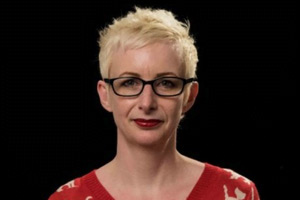
Emma Millions: "It was always difficult coming up with ideas for the show which hadn't already been done seeing as there had been so many episodes. Me and my then co-writer Marie Findley were fond of genre movies so we pitched a western episode - The Good, The Bad, And The Chuckles - and we were delighted when it was accepted. It was so much fun to write, playing with the tropes of cowboy movies. It was always an absolute thrill when you got to type the immortal, iconic words 'To me, to you'."

George Poles: "At the time of working on ChuckleVision, Simon Littlefield and I had been colleagues on radio shows like Week Ending and The News Quiz and were drafting a rather odd sitcom set in a local museum filled with very gothic staff and run by a conman (strangely, it didn't get anywhere). Writing for ChuckleVision was great fun, especially the episodes in Series 14 which I think was the only series which had a full season arc, in this case involving a ruby belonging to Dan the Van.
"My favourite episode was the season finale - A Change In The Weather - where we got to dress Paul & Barry up in dinner jackets for their own inimitable take on James Bond. I think most comedy writers yearn for the opportunity to be let off the leash and just have as much fun in as silly a way as possible - writing that episode felt very much like that."
ChuckleVision holds a unique place in the landscape of British sitcom. 22 years of slapstick shenanigans and 'silly you, silly me' all driven by the endless invention and imagination channelled into thousands of script pages. A true testament to the toil of the screenwriters who helped Paul & Barry create a comic legacy that will be enjoyed for generations.
See also: Celebrating ChuckleVision
Help us publish more great content by becoming a BCG Supporter. You'll be backing our mission to champion, celebrate and promote British comedy in all its forms: past, present and future.
We understand times are tough, but if you believe in the power of laughter we'd be honoured to have you join us. Advertising doesn't cover our costs, so every single donation matters and is put to good use. Thank you.
Love comedy? Find out more
